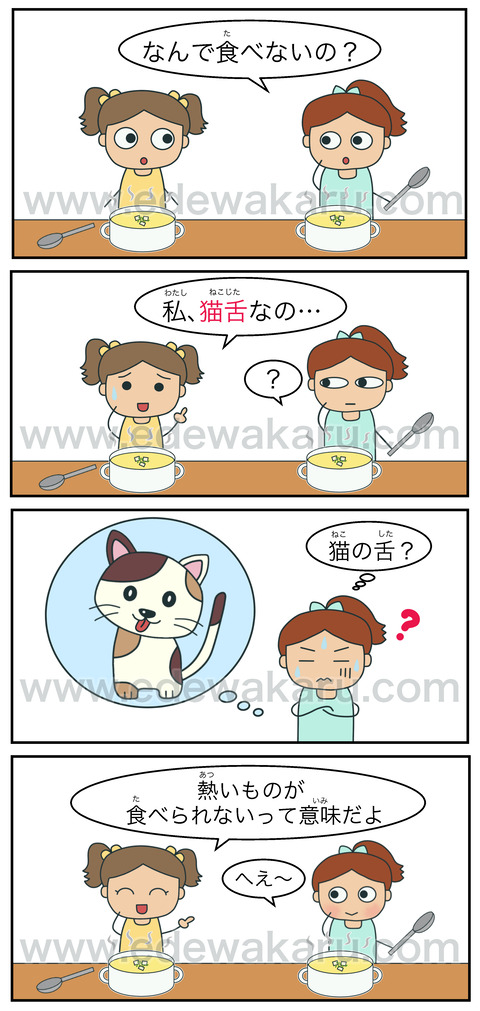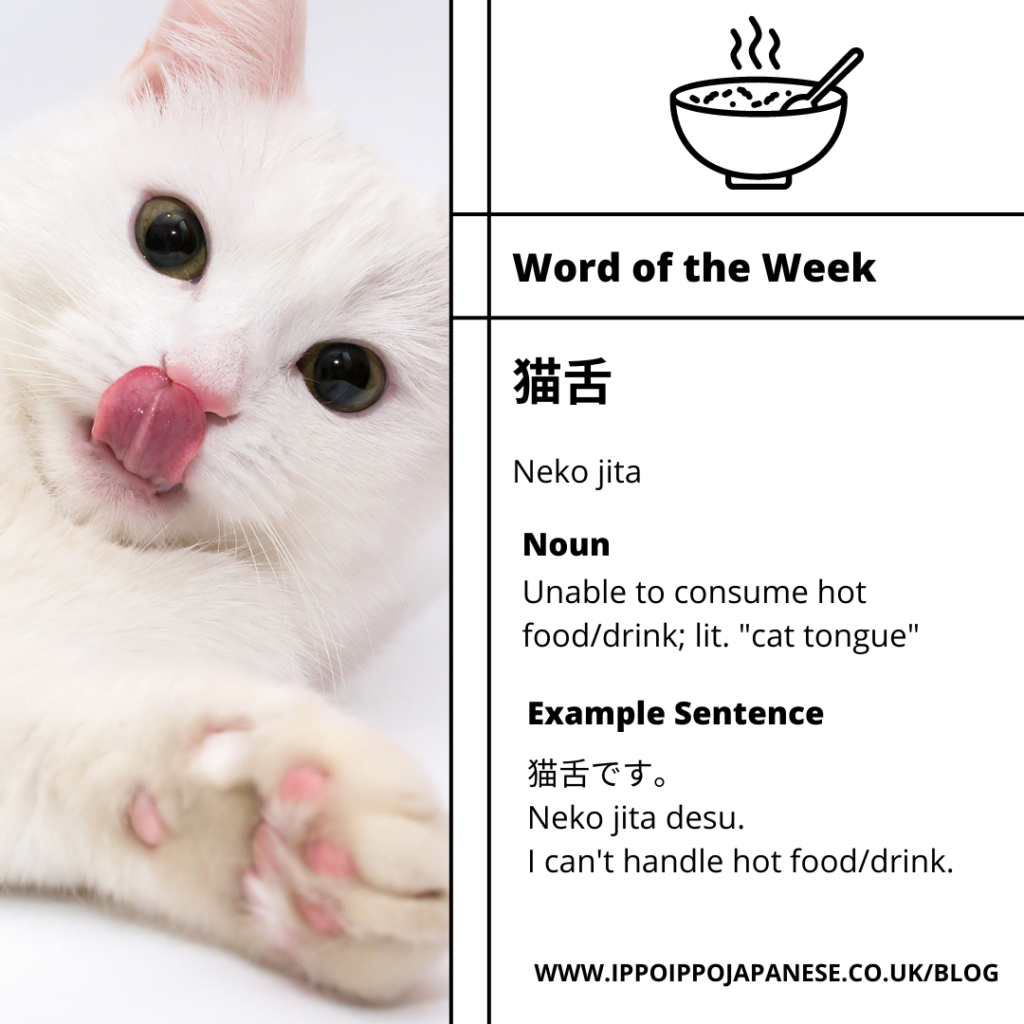Posted: 22nd September 2022
Hello and welcome to the Ippo Ippo Japanese Word of the Week!
This Week's Word Is...
猫舌 (neko jita)
Before We Begin
None of the links in this post are affiliated, which means I don't make money via companies like Amazon when you click on them. If you'd like to support the blog with a donation (however small!), you can do so via Ko-fi.
What Does 猫舌 (neko jita) Mean?
Taken literally, 猫舌 (neko jita) means "cat tongue". So what does it mean if your friend confesses that they're "cat tongue"?
Well, it may help to imagine a cat trying to drink a hot cup of coffee. While there are probably a few reasons why it wouldn't be a good idea to offer your cat such a beverage, you can probably imagine that it wouldn't appreciate the scalding temperature!
Of course, it's not just cats that don't like hot drinks - or foods, for that matter. You probably know someone who prefers to let things cool down before eating or drinking them, and equally, have probably come across people who do the exact opposite. (I'm definitely in the latter group!)
In Japanese, those who struggle to consume hot food or drink are called 猫舌 (neko jita).
Are you 猫舌 (neko jita)?
Fun Fact
A brief aside: did you know that in Japan, the 22nd of February is 猫の日 (neko no hi - Cat Day)? Click here to read my post on this topic, which includes some tips on how to express your love of cats in Japanese.
猫舌 (neko jita): Example Sentences
Alright. Now we're happy with what 猫舌 (neko jita) means, let's look at some of the ways you might hear it used.
- 猫舌なので、熱いものを食べるのは苦手です。(Neko jita nanode, atsui mono wo taberu no wa nigate desu. - I'm neko jita so I'm not good at eating hot things.)
- 猫舌なので、熱々のラーメンが食べられない。(Neko jita nanode, atsu atsu no raamen ga taberarenai. - I'm neko jita so I can't eat ramen when it's piping hot.)
- 小籠包は猫舌の敵だ。(Shōronpō wa neko jita no teki da. - Xiaolongbao* are the enemy of neko jita!)
*Xiaolongbao ("shōronpō" in Japanese) are a type of small Chinese steamed bun that have gained popularity in Japan recent years. (According to a friend of mine, this is due to Taiwan - where they're commonly found - becoming a popular destination for Japanese tourists, though I haven't been able to verify this.) Although xiaolongbao can mean something slightly different depending where you are, the version being referred to here is the "soup dumpling", famous for being incredibly hot in the middle!
猫舌 (neko jita): Example Dialogue
While researching this blog post, I found a mini dialogue that uses 猫舌 (neko jita) on one of my favourite Japanese language sites: 絵でわかる日本語 (e de wakaru nihongo - "Japanese through pictures").

Here's a typed out version of what's being said, with the characters labelled R (for the person on the right) and L (for the one on the left).
In kana/kanji:
R: なんで食べないの?
L: 私、猫舌なの・・・
R: ?
R: 猫の舌?
L: 熱いものが食べられないって意味だよ。
R: へえ~
In rōmaji:
R: Nande tabenai no?
L: Watashi, neko jita nano...
R: ?
R: Neko no shita?
L: Atsui mono ga taberarenai tte imi da yo.
R: Hee...
And in English:
R: Why are you not eating?
L: I'm neko jita...
R: ?
R: A cat's tongue?
L: It means I can't eat hot things.
R: Oh!
猫舌 (neko jita): Bonus Language Notes
Did you notice anything interesting while reading the above dialogue? Here are a couple of things I think it's making a note of.
1. The Japanese for "tongue" is "shita" - not "jita"!
This may sound totally contradictory after my intro to the word 猫舌 (neko jita), but let me explain!
Many words in Japanese change their pronounciation slightly depending on how they're combined with other words. In this case, the word "shita" (tongue) becomes "jita" when combined with "neko" (cat). Either way it's the same kanji (舌) - just with a different sound!
If you want to get into the nitty gritty of how this kind of sound change works, get out this excellent Tofugu article.
2. The kanji for hot food and drink is 熱 - not 暑!
I'll be honest: this is one I still have to think carefully about.
Here are two ways of writing the word "hot" in Japanese:
- 熱い
- 暑い
Both are read "atsui", but they're actually used for different things. For example:
- このコーヒー、熱いですね!(Kono kōhii, atsui desu ne! - This coffee is hot!)
- 今日、暑いですね!(Kyō, atsui desu ne! - It's hot today!)
Put simply, the kanji 熱 is used for hot things (something you can touch with your hand and feel is hot), while 暑 is for hot weather. The way I remember this is that 暑 has the kanji 日 (sun, day) in it, which reminds me of the weather.
You've reached the end of this post! I hope you enjoyed it.
For updates on posts like this sent straight to your inbox, sign up to my newsletter (sent no more than once a month):

Support Me on Ko-fi
If you've enjoyed this and would like to see more like it in future, please consider sending a donation - however small! - via Ko-fi. I don't include any affiliated links or ads on my website, so every little helps!
Please donate via the portal below or by going directly to the Ippo Ippo Japanese Ko-fi page.







